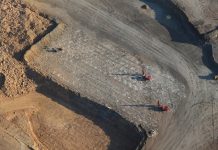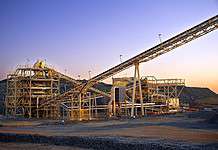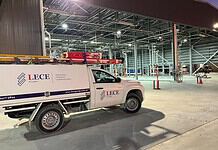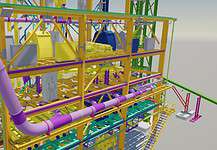Thunderbird production is a go!

The first significant heavy minerals sand deposit to be discovered in the Canning Basin, Sheffield Resources’ (ASX:SFX) Thunderbird mineral sand project is one of the largest and highest-grade mineral sands deposits in the world.
Hosted by highly weathered Broome sandstone, Thunderbird is a zircon and ilmenite rich valuable heavy mineral deposit.
Progressing from an exploration project to a substantial development project, a large high-grade maiden mineral resource of 1.37bt at 6.1% heavy mineral was declared for Thunderbird in December 2012.
A scoping study was completed in 2014 and a pre-feasibility study and pre-feasibility study update was released in 2015, leading to the announcement of a maiden ore reserve of 683mt at 11.3% heavy mineral in January 2016.
A bankable feasibility study was completed on Thunderbird in 2017 which demonstrated it could produce and market high-quality zircon and ilmenite at large volumes.
Sheffield executive chair Bruce Griffin gave some insight into the history of Thunderbird.
“The discovery was made in 2012. This was while the area had previously been explored by Rio [Tinto] but Rio hadn’t actually discovered the Thunderbird deposit when they relinquished the ground,” Mr Griffin told the Australian Mining Review.
“Fairly early in Sheffield’s drilling Thunderbird was discovered and it had to go through the various early stages of normal project maturation and by 2016 it was ready for funding.”
In Sheffield’s first round of Thunderbird funding in 2017, the company was unable to raise sufficient funding for full project development, which included all the downstream processing.
When Mr Griffin joined Sheffield in 2020, Thunderbird was reconfigured and all the downstream processing was taken out.
Yansteel and Sheffield then executed binding agreements in January 2021 to form a 50:50 joint venture called Kimberley Mineral Sands.
“Yansteel came along as a potential partner and we effectively agreed to a joint venture transaction with them in 2020 with approval in late 2020 and the joint venture was formally formed in March 2021,” Mr Griffin said.
“With their [Yansteel’s] funds, we were able to keep progressing the project in parallel with financing the project, so we were able to use their equity to keep the project moving forward.”
By October 2022, Sheffield had the full funding package agreed and the company was approximately 45% complete on construction of the project.
Production began in October 2023.
Start of Production
Sheffield is right at the start of its production journey at Thunderbird and is aiming to get to stable operations with 24/7 continuous work.
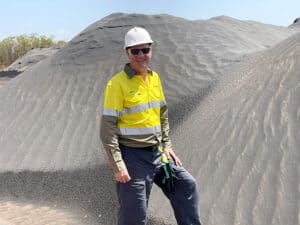
“It’s one of those things where startup is a journey not an event. I think sometimes people sort of imagine that there’s a button and you press it and it starts running,” Mr Griffin said.
“There are hundreds of buttons and there’s lots of individual pieces of equipment.
“The process of startups is that typically you’ll inevitably have a piece of equipment that won’t run as exactly as you expect it to. You also have early life failures on equipment, and you work your way through that.”
At full production, Sheffield is targeting to mine about 10mtpa of ore and then processing that to recover about 1.1mtpa of concentrate.
Of that, around 700kt is ilmenite concentrate which Yansteel is using as a source for their downstream pigment processing facilitates.
Then there’s 200ktpa of zircon concentrate which contains between 110kt and 120kt of zircon, and 200ktpa of paramag (paramagnetic) concentrate that contains lower qualities of zircon and other minerals such as monazite.
Project Construction
Whilst a portion of the construction was largely self-executed by the Kimberley Mineral Sands joint venture, construction of the wet concentrate plant and concentrate upgrade plant was completed by GR Engineering Services Limited (GRES), with work completed on time and on budget.
“The construction of the process plants was the core of what GRES were doing for us, using largely standard mineral sands processing equipment including spirals for the wet concentrate plant and wet magnetic separators for the concentrate upgrade plant,” Mr Griffin said.
“On time and on budget is a good outcome. It’s quite an unusual outcome in the resources sector.
“That was the core process contract which was quite mature engineering-wise and had been studied a couple of times and to the extent the design changed, we were removing things.
“So, the core plant hadn’t been changed significantly during the various studies and so it was pretty mature and that’s why I think GRES were able to deliver it on time and on budget.”
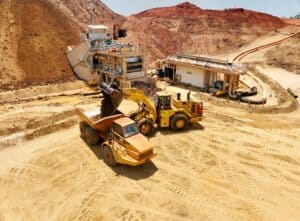
Other construction work included the tailings storage facility, the storm surge water pond, a 30km mine access road and adjacent works to an acceleration lane on the main Great Northern Highway, the accommodation village, a power plant and borefields.
“So the main construction activities are truly done,” Mr Griffin said.
As well as being on time and on budget, construction went over a million-man hours lost time injury (LTI) free.
“We went a million-man hours LTI free. Obviously, that’s something we wish to continue in operations,” Mr Griffin said.
Future Operations
Thunderbird is now in the ramp up period of stage one operations and Sheffield and their joint venture partner Yansteel will now get a sense of full throughput and recoveries with a potential expansion on the horizon.
Through its joint venture, Sheffield and Yansteel agreed on a development concept for stage one consisting of a 10.4mtpa mine production and 1085 tph process plant feed rate, producing zircon-rich non-magnetic concentrate and magnetic (ilmenite) concentrate.
Stage two sees the doubling the wet concentrator plant feed rate to 2170tph targeted later this decade.
“Stage two would be expanding the mine and the process plant, but what it really does is fully utilise the reserves,” Mr Griffin said.
“So, with stage one alone, there’s an attributable grade decline over the life of the mine. You don’t ultimately keep the process plant full and by doing stage two, you expand the mining capacity without having to expand the process plant by the same amount, and that allows us to fully utilise the plant for longer.”
Under stage one Thunderbird has a mine life of 33 years which will increase to 36 years under stage two.

